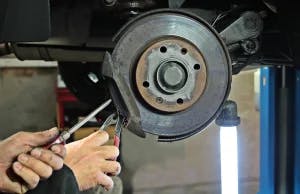Why Are Accidents with 18 Wheelers So Much More Serious?
Have you ever found yourself driving alongside a massive 18-wheeler and felt a sudden sense of unease? Youre not alone. Truck accidents involving these colossal vehicles can have devastating consequences. By working with Brian C. Gutierrez, you’ll learn why accidents with 18 wheelers are so much more serious, from their overwhelming size and weight to driver fatigue and limited visibility. By understanding the risks associated with sharing the road with these giants, we can all work towards safer roadways for everyone. Call Gutierrez Accident Injury Lawyer and let us guide you through the complexities of 18-wheeler accidents. Our team is dedicated to shedding light on the serious implications of collisions with these massive vehicles. From their sheer size and weight to potential factors like driver fatigue and limited visibility, we’ll educate you on the risks involved. Together, we can strive for safer roads and a better understanding of navigating alongside these giants. Reach out for a free consultation at 979-271-5338, because your safety on the road matters to us.

The Overwhelming Size and Weight of 18 Wheelers
One of the primary reasons truck accidents involving 18 wheelers are so much more serious than those involving smaller vehicles is the sheer size and weight of these commercial trucks. A fully loaded 18-wheeler can weigh up to 80,000 pounds, which is 20 to 30 times more than most passenger cars. This massive disparity in size and weight not only increases the risk of accidents but also contributes to more severe consequences when crashes do occur.
Disproportionate Damage in Collisions
When a large truck collides with a smaller vehicle, the force generated by the trucks substantial weight can result in extensive damage to the smaller vehicle and potentially life-threatening injuries for its occupants. In fact, the most prevalent types of injuries in collisions with 18-wheelers include:
- Head and brain injuries
- Spinal cord injuries
- Neck and back injuries
- Broken bones
- Internal injuries
Given these significant risks, many commercial truck drivers and other motorists must exercise caution and stay alert while sharing the road with these large trucks, often operated by trucking companies.
Challenges for Large Truck Occupants
While the size and weight of 18-wheelers pose a considerable threat to other road users, its important to recognize that truck occupants also face unique challenges in accidents. The height of the truck cab can result in a higher center of gravity, making the truck more prone to rollovers. Additionally, 18-wheelers often lack common safety features found in passenger vehicles, such as airbags, which can reduce the level of crash protection for the occupants.
Moreover, those in large trucks, including semi-trucks and tractor-trailers, are at risk of severe injuries due to truck crashes, such as back and neck traumas, whiplash, herniated discs, and spinal fractures.
The Complexities of Stopping an 18 Wheeler

Stopping an 18 wheeler is no simple task. The physics of stopping such a massive vehicle involves the removal of kinetic energy from the truck through the brakes in order to bring it to a halt. The weight and size of the 18 wheeler can significantly influence the stopping distance, making it harder for truck drivers to avoid collisions.
Longer Braking Distances Required
On average, an 18 wheeler traveling at 65 miles per hour requires a braking distance of approximately 525 feet, compared to just 316 feet for a passenger car weighing 4,000 pounds. The increased stopping distances of trucks pose a heightened risk of rear-end collisions, as drivers may not have enough time to react and brake accordingly.
The Perils of Sudden Stops
Sudden stops can have severe repercussions for commercial trucks. Firstly, due to their high center of gravity and heavy loads, they are more prone to rollovers when a sudden stop is made, resulting in the truck landing on smaller vehicles or the spillage of hazardous materials, causing substantial damage and injury.
Furthermore, sudden stops can cause rear-end collisions, particularly if the truck is hauling a trailer, leading to jackknifing and endangering the truck driver and other road users.
Limited Maneuverability and the Risks It Poses
The limited maneuverability of large trucks, such as an 18 wheeler, semi-truck, or tractor-trailer, is another factor that contributes to the increased likelihood of accidents. Due to their size and weight, trucks are more challenging to control and maneuver than smaller vehicles, making lane changes and tight turns particularly risky.
Difficulty Changing Lanes Safely
Trucks struggle to change lanes safely due to their size and weight, which can obstruct the drivers view of other vehicles in adjacent lanes. When changing lanes, truck drivers must take extra precautions, such as:
- Signaling their intentions well in advance
- Checking blind spots
- Using their mirrors effectively
- Adjusting their speed to match the flow of traffic
- Giving other vehicles plenty of space
- Being aware of the presence of motorcycles and bicycles
These precautions help truck drivers avoid collisions with other road users.
High Risk of Rollovers
The high center of gravity in large trucks makes them prone to rollovers, particularly when the truck leans on the opposite side of a curve. Furthermore, the taller the load, the higher the center of gravity, which can further increase the risk of rollovers.
Rollovers can result in catastrophic injuries, such as traumatic brain injuries and spinal cord injuries, which can have long-lasting consequences for the victims involved.
Fatigue Among Commercial Truck Drivers
Fatigue among commercial truck drivers is a serious issue that impairs judgment and increases the risk of accidents. Long hauls and rigorous schedules can lead to driver fatigue, which has a detrimental impact on alertness and reaction times.
The Impact of Long Hauls on Alertness
Long hauls and demanding schedules can lead to driver fatigue, which has a detrimental impact on alertness and reaction times. Disruptions to natural sleep patterns, reduced sleep duration, poor sleep quality, and abnormal sleeping schedules due to long working hours can all contribute to fatigue among truck drivers.
This can result in decreased reaction time, slower decision-making, impaired judgment, and an increased risk of falling asleep at the wheel.
Regulatory Efforts to Combat Fatigue
To address driver fatigue and ensure the safety of all road users, regulations and educational initiatives have been implemented in the trucking industry. These regulations include:
- Limiting the number of hours a commercial truck driver can drive each day and week
- Requiring rest breaks after a certain number of consecutive driving hours
- Implementing driver fatigue management plans to address federal and local drive-and rest-time regulations
These measures are aimed at promoting safe driving practices and reducing the risk of accidents caused by driver fatigue.
The Federal Motor Carrier Safety Administration (FMCSA) is responsible for implementing these regulations and has found that driver fatigue is a factor in 13% of all serious truck accidents.
Hazardous Materials and Their Role in Accidents
Hazardous materials carried by trucks can worsen accidents, leading to more severe injuries and containment challenges. It’s important to consider the influence of hazardous materials on truck accidents and how they increase injury severity and complicate containment and cleanup.
Increased Severity of Injuries
Accidents involving hazardous materials can cause severe injuries, burns, or chemical exposure. The type of hazardous material involved, such as compressed gas, explosives, or poisons, can also contribute to higher injury severity. Immediate effects of chemical exposure resulting from a tanker truck accident can include skin irritation, eye irritation, respiratory illnesses, burns, and systemic toxicity, while long-term effects can include untreatable respiratory conditions, cancer, and other severe medical conditions that can be potentially life-threatening.
Containment and Cleanup Challenges
Cleanup and containment of hazardous materials after an accident can be complex and costly. Specifically trained teams with the necessary qualifications and equipment handle the cleanup process, and the party responsible for the use, transportation, storage, and disposal of hazardous substances is liable for the removal and proper disposal of hazardous materials and any contaminated absorbents.
The potential environmental impacts of hazardous material spills from truck accidents are far-reaching and can include environmental contamination, pollution of air and water, and the release of toxic substances into the environment.
Visibility Issues for Truck Drivers
Visibility issues for truck drivers increase the risk of collisions, particularly in no-zone areas where large blind spots obstruct the drivers view. There are common visibility issues that truck drivers encounter as well as hazards linked to tailgating large trucks.
Understanding the “No-Zone” Areas
Large blind spots, or no zones, obstruct truck drivers view and contribute to accidents. These no zones include areas in the front, back, and sides of the truck where the drivers view is limited or nonexistent.
Understanding and avoiding these no-zone areas is crucial for the safety of all road users.
The Dangers of Tailgating Big Rigs
Tailgating big rigs is dangerous due to the limited visibility of the truck driver and the increased risk of rear-end collisions. Vehicles that tailgate trucks are often small and may go unnoticed by the truck driver. This increases the risk of accidents occurring.
Drivers of smaller vehicles must maintain a safe distance from large trucks to prevent accidents and guarantee the safety of all road users.
The Legal Process After a Truck Accident
Navigating the legal process after a truck accident can be complex and requires experienced representation such as from Brian C. Gutierrez to secure maximum compensation for injury victims. Your attorney needs to have experience in trucking accident cases and how a competent attorney can assist injury victims in obtaining the compensation they deserve.
Why Experience Matters in Trucking Accident Cases
Experience in trucking accident cases is crucial for navigating complex legal processes and securing fair compensation. An experienced truck accident lawyer such as Brian C. Gutierrez:
- Understands the potential long-term effects of injuries
- Knows how to maximize compensation for victims
- Possesses the knowledge and experience to effectively negotiate with insurance companies
- Advocates on behalf of their clients
Securing Maximum Compensation for Injury Victims
A skilled attorney can help injury victims obtain maximum compensation for medical expenses, lost wages, and other damages. By working diligently on a contingency-fee-basis, a truck accident lawyer ensures that victims obtain full and equitable compensation for their injuries and losses.
How Brian C. Gutierrez Can Help You
Understanding the reasons behind the severity of accidents involving 18 wheelers can help promote safer driving practices and encourage greater awareness of the risks associated with sharing the road with these large vehicles. From the overwhelming size and weight of 18 wheelers to driver fatigue and limited maneuverability, a multitude of factors contribute to the severity of truck accidents. By being vigilant, educating ourselves, and seeking experienced legal representation when accidents do occur, we can work together to create safer roadways for everyone.
At the Law Office of Brian C. Gutierrez, we provide comprehensive legal support for truck accident victims, including:
- Free case evaluations
- Assistance with passenger vehicle repairs
- Medical care
- Aggressive representation to secure maximum compensation for injury victims
If you or a loved one has been involved in a truck accident, dont hesitate to contact us at 979-271-5338 to schedule a free consultation.
If you need a trucking accident attorney in Bryan, TX or College Station, contactBrian C. Gutierrez, PLLCfor experienced representation.
Our semi truck accident lawyer in Bryan, TX can help you build a strong case. We will obtain the crash report, conduct our own investigation, gather evidence, interview witnesses, hire experts, inspect the tractor-trailer, and if necessary, file a lawsuit and subpoena records to prove the negligence of the truck driver and the carrier.
Get a free case evaluation

